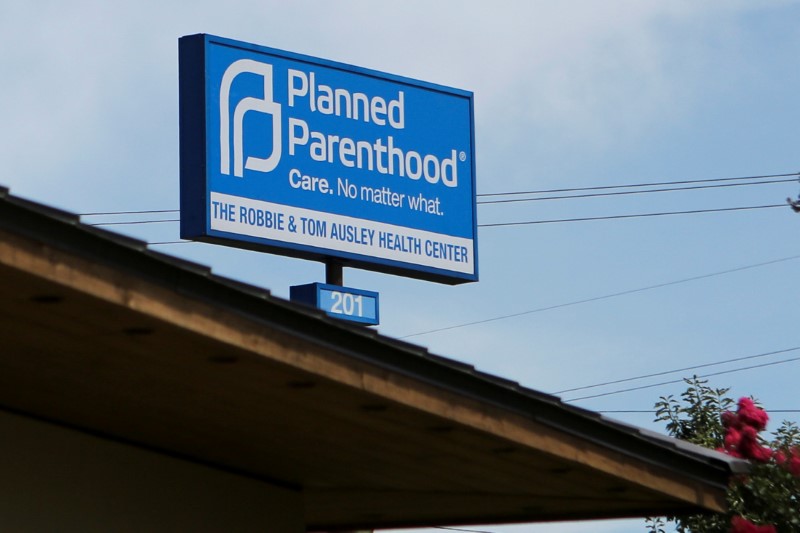By Jonathan Allen and Jilian Mincer
NEW YORK (Reuters) - Planned Parenthood, the national health organization that would have lost federal funding under sweeping healthcare overhaul legislation, views the withdrawal of the bill on Friday as a temporary reprieve, not the end of a threat to its existence.
Officials of the organization - long a target of those who oppose its abortion services - anticipate further attempts by Republicans to curb its participation in federally funded public health programs, a major source of its funding.
In a major setback for Republican President Donald Trump, U.S. House of Representatives leaders pulled the healthcare bill after a rebellion by Republican moderates and the party's most conservative lawmakers left them short of votes. Democrats were unified against it.
Planned Parenthood leaders will meet in Washington next week to plan their strategy for coming rounds in what they see as a protracted fight.
"It's one good night's sleep, and then we have to see what they are going to cook up," Chris Charbonneau, chief executive of Planned Parenthood of the Great Northwest and the Hawaiian Islands, said in a phone interview. "They're trying to find some vehicle that they could hook some Planned Parenthood defund(ing) to."
Many Republicans oppose the organization, some on religious grounds, because its healthcare services include abortions, although it receives no federal funding or reimbursement for abortions, as stipulated by federal law.
The federal funding it receives is primarily through reimbursement via Medicaid and the Title X Family Planning grant program for its care for low-income patients.
Abortion opponents said Republican leaders had promised for years to end federal reimbursement for Planned Parenthood, and that voters would continue to hold them to this. Before winning the presidential election in November, Trump had also promised to defund Planned Parenthood, and fought to get the healthcare bill passed.
"I'm confident the Republicans in Congress and the president will move ahead and defund Planned Parenthood," said Joe Pojman, executive director of the anti-abortion Texas Alliance for Life.
The issue "is so dear to the electorate who put the Republicans and president in office," he said after the bill was pulled.
On the other side of the issue, Georges Benjamin, the American Public Health Association's executive director, welcomed the withdrawal of the legislation, and said the renewed public attention on Planned Parenthood may make future efforts to limit its funding more difficult.
"I think in many ways it's going to be harder for them to go after Planned Parenthood, not that they won't," he said in a telephone interview.
"I hope people recognize that Planned Parenthood did more than abortions, that they recognize it has a broader portfolio," he said, referring to services such as cancer screenings provided by the organization.
PUBLIC SUPPORT
The proposed American Health Care Act (AHCA) would have repealed many parts of the Affordable Care Act, popularly known as Obamacare, which Democratic President Barack Obama signed into law in 2010.
Charbonneau and other Planned Parenthood officials pointed to a widespread outpouring of public opposition to AHCA as one of the reasons that its moderate Republican backers could not reach a compromise with members of the conservative Freedom Caucus, who demanded a complete evisceration of Obamacare.
"The irony is that the Freedom Caucus, which is very pro-life and against Planned Parenthood, allows P.P. to continue if they stop this plan!" Trump wrote in a message on Twitter on Friday morning.Public opinion polls found the AHCA bill was unpopular among Americans, including Republican voters, and that there was broad public support for funding some of Planned Parenthood's work. In a Reuters-Ipsos poll conducted last month, almost half of 5,459 American adults surveyed said Planned Parenthood should receive federal funding; about a third said they should not.
Even so, about 70 percent of those people said Planned Parenthood should get the money when they were asked about specific services such as free cancer screenings, contraception and prenatal care. Women were significantly more likely than men to think the organization deserved funding.
The Planned Parenthood Federation of America had described the Republicans' proposed law as containing a "long list of anti-women's health provisions" in a statement earlier this week. The federation's president, Cecile Richards, cheered its withdrawal on Friday.
The organization said that 2.5 million men, women and children rely on Planned Parenthood for cancer screenings, medical testing, contraception, abortions and other healthcare services each year at around 700 health centers around the country.

The warnings were echoed by two dozen national public health organizations, including the American Public Health Association, the American Nurses Association and the American College of Nurse-Midwives, in a letter to U.S. lawmakers in February. They argued that in some parts of the country, particularly rural areas, Planned Parenthood was the only nearby provider of health services.